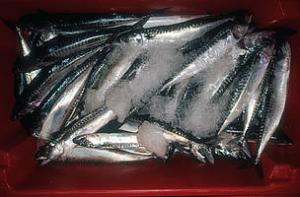WWF Statement on Marine Stewardship Council Reforms
The Marine Stewardship Council (MSC) has been operating for two decades and in that time it has provided seafood buyers and consumers with a means to use their purchasing power to support and drive more sustainable practices in the fishing industry.

MSC certified fish
The MSC has created an internationally-recognized standard for fisheries environmental performance and built a transparent system to assess fisheries against this standard using incentives provided by the market. In doing so, the MSC has provided a global framework for encouraging fisheries to improve towards sustainability and has significantly contributed to ocean conservation in that time. Additionally, the MSC’s chain of custody requirements have helped to ensure the traceability, legality and transparency of many fisheries.
While the MSC helped create a widely used environmental standard for fisheries, as it enters its third decade, and the world’s oceans bear increasing pressure, the MSC must continue to ensure that its standard stays consistent with current science and global best practice. This means that its environmental performance indicators must fully measure the health and integrity of target fish stocks as well as all the other species and wider marine ecosystems that fisheries affect. Additionally, the MSC assessment methods must ensure and safeguard beyond reasonable doubt that certified fisheries have credibly met all aspects of the standard.
At this time, WWF believes the MSC needs to commit to and accelerate key reforms so that it can maintain its reputation as the world’s leading fisheries standard and certification system, and play its part in ocean conservation to its full potential.
WWF and other stakeholders have advocated for scientifically rigorous, transparent and credible assessments within the MSC system for some years. The MSC has made improvements to a number of its systems and to the standard itself, but there is still much more to do if the MSC is to evolve as scientific knowledge and practical experience continue to grow.
In January 2018, in response to a number of stakeholders calling for additional reforms, the MSC board issued a public statement following which WWF published a summary response that can be accessed here. In its preliminary response, WWF committed to providing more detail on the outstanding MSC system reforms and safeguards that we believe need attention, and that fall into two main categories: the accuracy and objectivity of the assessment process and the ecological rigour of the standard:
Ensuring Accurate and Objective Assessments - WWF recommends that the MSC prioritize actioning these core reforms in the immediate term:
1. The MSC certification process needs additional oversight and procedures to ensure that peer reviewer and stakeholder comments are fully resolved, and that decisions, especially those that are scientifically-contested, are grounded in the strongest possible checks and balances.
2. Conformity assessment bodies (CABs) that undertake assessments must be impartial and act objectively and independently of their clients. CABs must use sound science and specific knowledge to justify all scoring, and where data are lacking, they must adopt the precautionary principle as the basis for decisions.
3.The objections procedure must include the opportunity for independent scientific review of a CAB’s scoring decision and justifications where there is clear controversy and/or competing scientific and knowledge analysis.
Ensuring Ecological Rigour of the Standard - WWF recommends the MSC action these important reforms with a clear time-frame for completion:
The MSC must not allow fisheries that purposefully target marine mammals (in order to facilitate fishing activities) to be certifiable.
The MSC standard must strengthen safeguards for endangered, threatened and protected species and ensure that the cumulative impacts of fisheries do not hinder the recovery of overfished, and endangered, threatened and protected species.
The MSC standard must strengthen the safeguards around bycatch, including the cumulative impacts of fisheries on bycatch (retained and discarded), and make it mandatory for MSC-certified fisheries to minimize unwanted bycatch and discards.
Fisheries certified with conditions (actions that must be taken by a MSC-certified fishery to meet the standard’s required performance level) must ensure that conditions are fulfilled and Action Plans are implemented within the five-year certificate period, with progress independently verified.
The MSC standard must strengthen requirements to improve the conditions and safety for fishing boat crews and observers in line with the core International Labour Organisation requirements and going beyond voluntary disclosure.
Full transparency of certified fisheries has to be ensured, and this includes providing access to 24/7 tracking data.
All the activity of a MSC-certified fishery must be certified or in a comprehensive Fishery Improvement Project developed to meet the standard within five years.
Clear and effective guidance must be provided to ensure that, as a minimum, fishing operations accord with, and do not impede, the objectives of marine protected areas, and do not harm vulnerable marine ecosystems.
While WWF was the co-creator of the MSC twenty years ago, the MSC has long been an independent organisation with its own board and management; the MSC’s future rests in its own hands. WWF maintains the view that high quality certification for seafood can be an important complement to the array of measures available for ocean conservation and to this end, we will advocate for continued improvement by the MSC.
Source: World Wildlife Fund
- 312 reads
Human Rights
Fostering a More Humane World: The 28th Eurasian Economic Summi

Conscience, Hope, and Action: Keys to Global Peace and Sustainability

Ringing FOWPAL’s Peace Bell for the World:Nobel Peace Prize Laureates’ Visions and Actions

Protecting the World’s Cultural Diversity for a Sustainable Future

Puppet Show I International Friendship Day 2020

